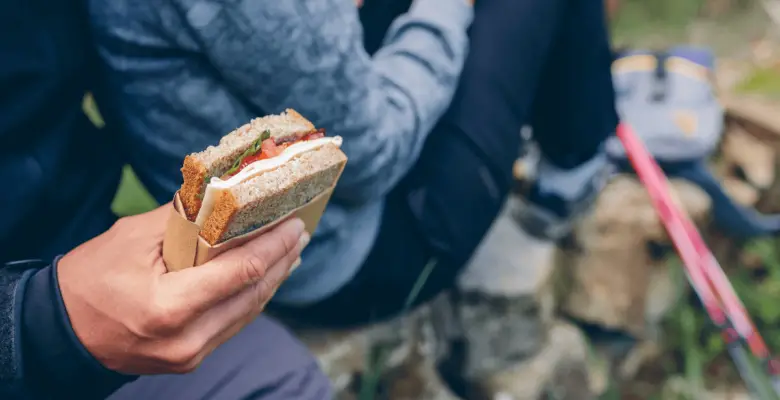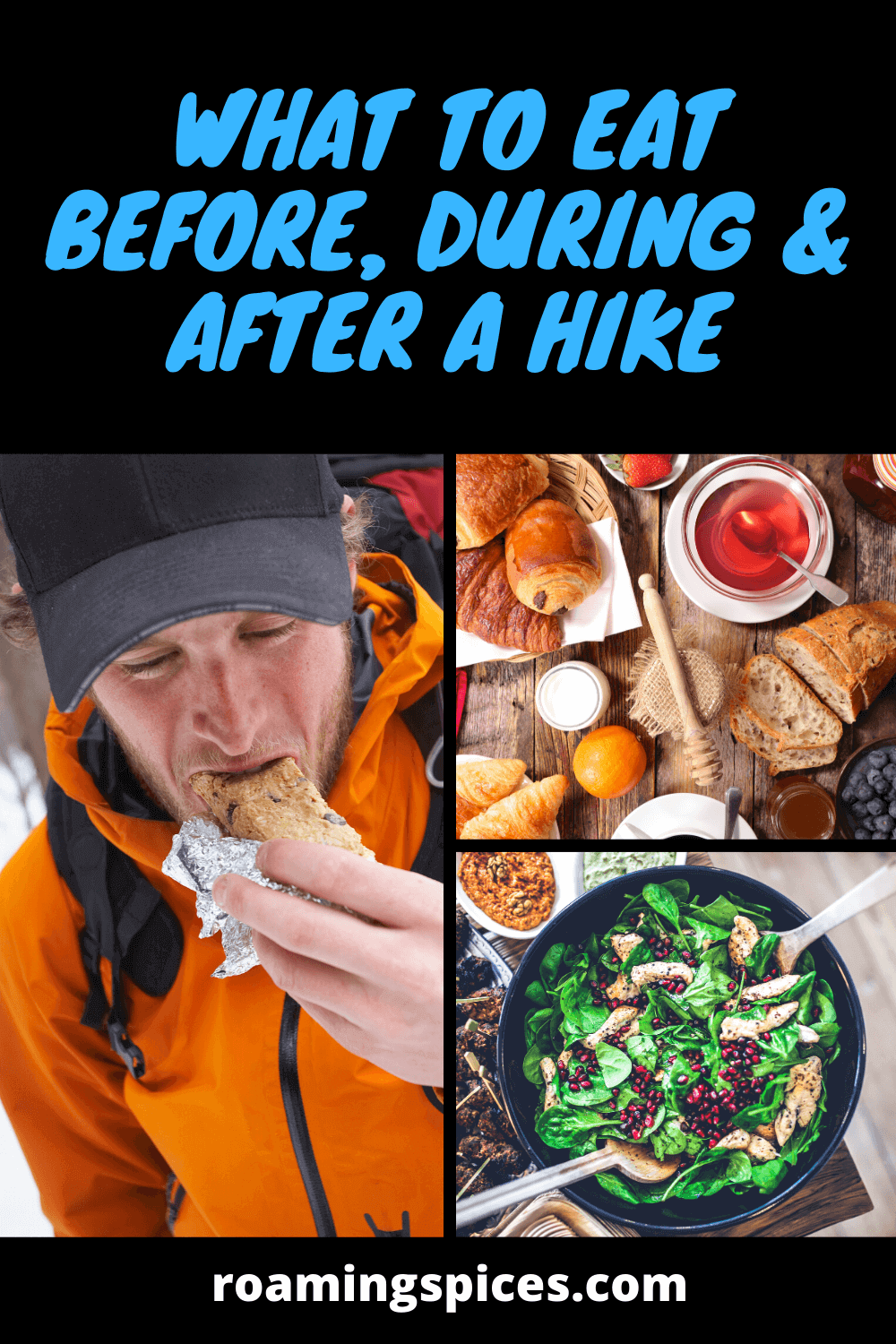
Hiking Nutrition
There’s a big difference between good food and bad food, especially when it comes to a strenuous physical activity like hiking. By eating correctly, you’ll be able to significantly enhance your physical abilities and stamina. Below, you’ll learn all about what to eat before a hike, while hiking and after your hike
What to Eat When Hiking: Before, During and After
Whether you’re going for a quick hike in a nearby park or a multi-day trek through the mountains, it’s important to eat properly. Feeding yourself is not just something you do at a restaurant or quickly during a work break. It affects basically everything you do (or want to do) in life.
When done correctly and strategically, eating can greatly increase your physical performance, overall wellbeing and even your mood. After all, food provides the only fuel for your body, which includes both your muscles and your brain.
The Importance of Food for Hiking
Since hiking is a physical activity that requires endurance and involves muscle stamina, it’s really important that you ensure your body is fueled properly and sufficiently. In other words, both the quality and quantity of the food you eat matters.
Macronutrients
As far as quality is concerned, you should pay attention to the three macronutrients that make up all food (and the amount of energy they can provide):
- Carbs – Fuel for your body, used right away or stored as glycogen in your muscles
- Proteins – Building blocks of your body, as well as performing numerous essential (metabolic) functions
- Fats – Important for your brain, absorption of other nutrients, and as an energy source
How much you need of each depends on the timing of your meal or snack. We’ll discuss in greater detail what to eat before a hike, during a hike and after a hike below.
For now, just remember that carbs and proteins are, on the whole, the important nutrients for hikers. Basically, eating plenty of carbs is important before and during your hike, while protein is most effective after your hike.
Fat is essential, too, but most good hiking snacks—especially those with coconut, dark chocolate and nuts—will have plenty of that anyway.
A widely accepted hiking food rule of thumb is that hikers should eat 60% carbohydrates, 30% proteins and 10% fats.
Micronutrients
Additionally, you should also try to incorporate some essential micronutrients in your hiking meal plan. Micronutrients are essential nutrients like vitamins and minerals.
When it comes to hiking and proper muscle functioning, you should consume sufficient amounts of calcium, zinc, potassium, magnesium, iron and sodium (salt). Important vitamins include A, C, E and the entire B group, all of which directly relate to exercise. Here you can find out more about micronutrients for hikers.
Water
In addition to the three macronutrients of hiking food, water is the fourth main component of your hiking diet. Even if you’re not exerting yourself too much, you’ll still lose more water than if you were sitting on the couch.
The exact amount of water you should drink depends greatly on the terrain and length of your hike, though. As a very minimum, you should count on 16 ounces (473 ml) of water per hour of hiking, but you’ll most likely need a lot more than that.
Additionally, to keep your body fluid levels up throughout your hike, it’s better to take small sips regularly rather than just a few big gulps when you take a break.
What to Eat Before a Hike?
It’s important to fuel up your body before you start your hike. Depending on when you’re starting your adventure, always start with a big and nutritious breakfast or lunch. Carbs should be your main focus here. These are the macronutrients that will act as your primary energy source on the trail.
It’s better to opt for complex carbs instead of simple carbs—whole grains over processed sugars. Your body will have to work harder to break down these complex carbs, which means they’ll provide energy for hours.
Also, try to include some healthy fruits and vegetables in your pre-hike meal. These ingredients are packed with micronutrients and can also provide some extra carbs.
Feel free to have a cup of coffee with your breakfast, but remember that caffeine is a diuretic—it expels water from your body. If you have coffee, make sure to drink sufficient water before your hike, too. It’s important to pre-hydrate before you hit the trail
Pre-Hiking Food Ideas
Some excellent examples of what to eat before a hike include the following:
- Peanut butter and jelly sandwich
- Low-fat yoghurt
- Whole Grain cereal, oatmeal, bagels or bread
- Eggs
- Whole Grain pasta or brown rice
- Fruits and vegetables
- Nuts and seeds
What to Eat When Hiking?
Even if you’ve enjoyed a healthy, filling and nutrient-packed pre-hike meal, it won’t sustain you throughout a long hike. Ideally, you should have a couple of healthy hiking snacks at least every two hours.
Remember to choose snacks that contain as few ingredients as possible, and stay away from highly processed foods. Peanut butter, for example, should only contain peanuts and salt. So, no preservatives, hydrogenated oil or other scientific-sounding ingredients.
Additionally, added sugars aren’t ideal either. Choose bananas or apples over milk chocolate or M&Ms.
Your focus should still lie on the three macronutrients, though, with carbs being the main staple. The best snacks to bring on a hike, including the best energy bars for hiking, consisting of complex carbohydrates, lean sources of protein and some healthy fats.
Best Trail Food Ideas
If you’re trying to figure out what to eat when hiking or looking for the best snacks for long hikes, here are some great suggestions:
- Dried fruits
- Dark chocolate-covered nuts
- Crackers and cheese
- Healthy energy bars
- Tuna packets
- Bananas and other small fruits
- Wholegrain sandwiches or tortillas
What to Eat After a Hike?
After your hike, it’s protein that you need. While carbs provided the majority of the energy you used during your hike, your muscles will need repair afterwards. It’s protein—the building blocks of your body—that can do that.
This, of course, doesn’t mean you should have a fast-food hamburger or pizza after your hike. Even though you might be starving, try to go for the healthy option instead. Complex carbs with a delicious, healthy type of protein is always a winner. Including some healthy fats wouldn’t hurt you either after your hike.
Whatever you decide to eat after a hike, try to refuel your body within one hour after you finish your hike.
Post Hiking Food Ideas
A great post-hike meal consists of complex carbs to replenish the glycogen in your muscles, while lean protein repairs damaged muscles and other body tissues.
It’s also smart to add some anti-inflammatory spices to your meal, which can improve recovery time. Great examples of those are curry powder, turmeric, ginger and garlic.
Some of my personal favourite meals to have after a hike include the following:
- Whole Grain pasta with fish or seafood
- Lean beef, preferably steak, and a mixed salad with an olive oil-based dressing
- Chicken and black bean burrito
- Turkey sandwich with kettle-cooked veggie chips
If you’d like a lighter snack for after your hike, try one of these:
- Low-fat yoghurt with berries
- Protein shake with fruit, such as a banana, apple or pear
Remember that protein is the most essential macronutrient in your post-hike meal, with complex carbohydrates a close second.
Additionally, don’t forget to replenish your body fluids, too! Have a pint of water after your hike. Personally, I always really enjoy a visit to a local craft brewery or pub after a hike, but remember that beer—just like caffeine—is a diuretic. Drink plenty of water before, during and after your hike!
Like Our Article? Please Pin it!


Leave a Reply